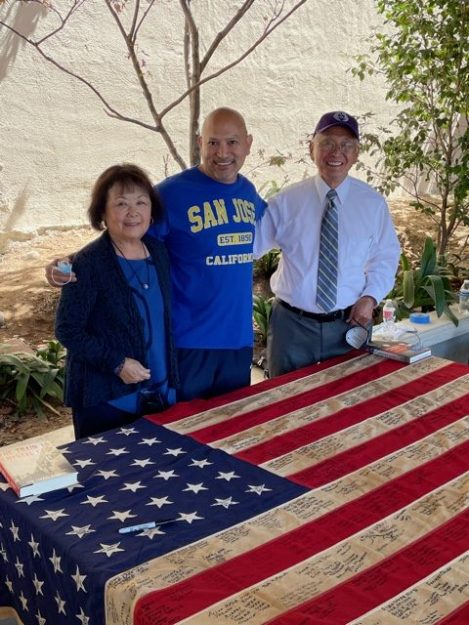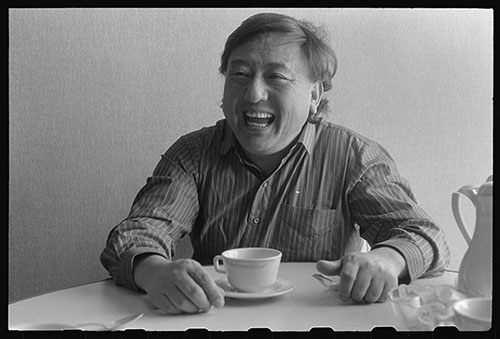Nothing is permanent, so everything is precious. Here’s a selection of some happenings—fleeting or otherwise—in the Buddhist world this week
Allen Ginsberg Photography Exhibit Featuring Gelek Rimpoche Opens at the Tibet House
This week, Tibet House US debuted Transforming Minds: Kyabje Gelek Rimpoche and Friends, a collection of 40 photographs taken by poet Allen Ginsberg between 1989 and 1997. Gelek Rimpoche, considered one of the great teachers of the 20th and 21st century, was one of the last Tibetan lamas educated in Tibet. Ginsberg, known for his poetry, was also a serious photographer who often captured his friendships, but didn’t photograph another teacher like he did Gelek Rimpoche. Given the warmth and emotion that come through the carefully selected black and white stills, narrowed down from over 500 negatives and some of them never-before-seen, it makes sense that curators Peter Hale and Ben Chatag personally knew the photographer and subject. Hale worked for Ginsberg’s estate for five years before the poet passed away, and Chatag is Gelek Rimpoche’s grandson. The exhibit is on view until December 12, 2021 (details here).
Robert Thurman Discusses His New Book in a Live@Tricycle Event
On September 21, Tricycle hosted Robert Thurman, renowned Tibetan Buddhist scholar and co-founder of the Tibet House US, in a live conversation with editor-in-chief James Shaheen. The two explored themes from Thurman’s recent book Wisdom Is Bliss: Four Friendly Fun Facts That Can Change Your Life, including the nature of reality as bliss, the eightfold path as a training in “realism,” and how to find joy along our own path of learning. A recording of the talk can be viewed here.
Zen Buddhist Priest Ruth Ozeki’s New Novel Hits Bookstores
Filmmaker, novelist, and Zen Buddhist Priest Ruth Ozeki came out with her latest novel, The Book of Form and Emptiness, on September 21. Described as a “Zen Buddhist parable of consumerism” by the New York Times, the novel follows Benny Oh, a teenager who starts hearing the voices of everything around him following his father’s death. You can listen to Ozeki explain some of the Buddhist strands within the novel and her contemplative approach to writing in a recent Tricycle Talks episode. Find the full podcast episode here, or read a published excerpt here.
Buddhist Temple of San Diego Hosts Flag-Signing Initiative to Honor Survivors of Japanese-American Internment Camps
On Sunday, September 19, the Buddhist Temple of San Diego hosted Japanese-American survivors of World War II internment camps and family members for a flag signing ceremony organized by Santa Clara County judge Johnny Gogo, the San Diego Union Tribune reports. Gogo asked the survivors and family members to sign one of two vintage American flags that he has brought to Washington, Utah, Hawaii, and different parts of California. Among the survivors was Rev. Kenji Akahoshi, the minister of the temple, who was imprisoned with his family at Camp Amache in Granada, Colorado when he was very young. Though his parents didn’t speak much about their time in the internment camp, Akahoshi told the San Diego Union Tribune, “Being rejected or not being accepted is a deep psychological scar.”

“Over 60 temple members and community friends, who were interned at various camps throughout the western U.S., signed one of two flags on display,” Akahoshi shared with Tricycle. “Gogo will donate one flag to the Japanese American Museum of San Jose in commemoration of Fred Korematsu Day on January 30, 2022.”
A Community Meditation Center Takes Root in Port Townsend, Washington
After a false start following the refusal of an application to open a meditation center in a building in Fort Worden State Park, Bill Porter—or Red Pine, the translator of Chinese Buddhist texts—and Isaac Gardiner—a Buddhist monk and osho—have acquired four lots in the center of Port Townsend for the long-planned Port Townsend Meditation Center. Though he originally conceived of the project as a Buddhist meditation hall, Porter adjusted the vision to a non-denominational community center when it was planned for a national park. The location may have moved, but the focus on inclusion has only strengthened. Porter thinks the new setting in the center of town is even better. He also plans for the meditation hall to be in the Chinese style with a bench around the perimeter for those who have trouble sitting on the floor. Artist James Turrell will contribute to the center’s design, in part to honor his former roommate and fellow artist Tom Jay, who constructed a bell for the meditation hall just before he passed away two years ago. Though the building’s design and construction plans are in their infancy, Porter says that no matter what, the bell will be on display.
Buddhist Monk Ven. Bhikkhu Sanghasena Acknowledged with World Peace Award
On September 21, the Central Institute of Buddhist Studies, located in Ladakh, India, hosted the 11th International Peace Conference in honor of the United Nations World Peace Day. During the conference, Ven. Bhikkhu Sanghasena was awarded the Seventh Dr. A. P. J. Abdul Kalam World Peace Award for his efforts in promoting peace and fostering human values of integrity, compassion, and social responsibility. The monk is the founder and president of the Mahabodhi International Meditation Center (MIMC), founder of the Save the Himalayas Foundation, founder of the Mahakaruna Foundation, and advisor to the International Network of Engaged Buddhists (INEB). Read more about Ven. Bhikkhu Sanghasena’s charitable work here.
Tibetan Writer Ra Tsering Dhondup Dies Eight Years After Being Released from Prison
The Tibetan writer and former political prisoner Ra Tsering Dhondup died this week in Chengdu, China after eight years of suffering from ill health and liver disease following his release from Mianyang Prison. Gendun Tsering, a friend and former colleague of Dhondup, told Radio Free Asia that Dhondup was arrested in February 2010 for publishing a magazine “whose content criticized the Chinese communist government.” Writing under the pen name Shinglo Marpo, Dhondup had described conditions in Tibet following the 2008 protests against Chinese rule and the ensuing deaths and arrests. After enduring harsh treatment and a lack of medical care during a three-year sentence, Dhondup’s health severely deteriorated, said Tenzin Dawa, a researcher at the Tibetan Centre for Human Rights and Democracy in Dharamsala. “This is the Chinese government’s way of avoiding responsibility for their crimes,” Dawa said, referring to reports of Tibetan political prisoners being freed in critical condition due to injuries inflicted in custody.
Thank you for subscribing to Tricycle! As a nonprofit, we depend on readers like you to keep Buddhist teachings and practices widely available.
